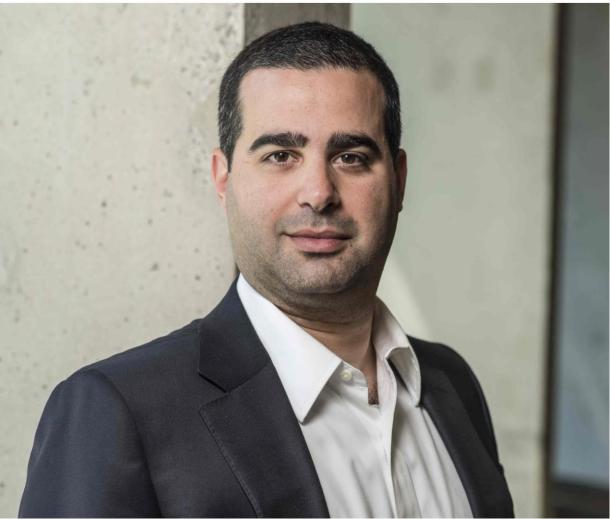One of Canada’s preeminent neurosurgeon scientists receives prestigious award.
The Royal is pleased to announce that Dr. Nir Lipsman of Sunnybrook Health Sciences Centre and director of Sunnybrook’s Harquail Centre for Neuromodulation, is the 2024 winner of The Royal-Mach-Gaensslen Prize for Mental Health Research.
Annually, the prestigious Royal-Mach-Gaensslen Prize for Mental Health Research – sponsored jointly by the University of Ottawa Institute of Mental Health Research at The Royal and the Mach-Gaensslen Foundation of Canada – is awarded to an outstanding mental health researcher enabling future exploration and discovery.
Dr. Lipsman’s work addresses one of the most urgent challenges in mental health: finding effective treatments for individuals with treatment-resistant psychiatric conditions. Over the past decade, he has transformed Canada’s psychiatric neuromodulation landscape, leading revolutionary clinical trials that offer hope to patients who have exhausted conventional therapies. His pioneering efforts in deep brain stimulation and non-invasive focused ultrasound target disorders like depression, obsessive-compulsive disorder, and anorexia nervosa—conditions that have left many without viable options.
As the Harquail Chair in Neuromodulation and Director of Sunnybrook’s Harquail Centre, Dr. Lipsman’s multidisciplinary approach bridges neurosurgery, neurology, and psychiatry, providing innovative therapeutic solutions for those most in need. His work has become a lifeline for patients and a vital resource for clinicians, offering novel approaches to some of the most treatment-resistant mental illnesses.
“This prize means a great deal to me, personally and professionally,” said Dr. Lipsman. “In being recognized, I want to acknowledge how incredibly privileged I am to work with the team that I do – an outstanding group of clinicians, coordinators, physicists and scientists who helped design and advance the tools we use to care for some of the most vulnerable and sick patients. This is an incredible validation of the work we're doing and a recognition of the Harquail and Sunnybrook team.”
Highlights of Dr. Lipsman’s work include:
- Led the world’s first trials of deep brain stimulation for severe alcohol use disorder and post-traumatic stress disorder.
- Conducted the world’s first study of MRI-guided focused ultrasound for difficult-to-treat obsessive-compulsive disorder and depression.
- Pioneered among the world’s first use of deep brain stimulation electrodes that can “sense” brain activity in cases of severe depression.
- Developed personalized approaches for both invasive and non-invasive brain surgeries, using advanced imaging techniques to better target treatment.
- Directs the largest center for repetitive transcranial magnetic stimulation (rTMS) among non-mental health hospitals in Ontario.
- Established Canada’s first multi-disciplinary psychiatric neuromodulation clinic, bringing together neurosurgeons, psychiatrists, and psychologists under one program.
- Running 14 clinical trials at the Harquail Centre for Neuromodulation, focusing on a variety of brain conditions with an emphasis on mental health. These studies include rTMS, deep brain stimulation, focused ultrasound, and emerging treatments such as esketamine and psychedelics.
"Dr. Lipsman’s visionary leadership and pioneering research as a leading physician scientist have profoundly advanced our understanding of how to address some of the most complex neurological and psychiatric disorders," says Dr. Florence Dzierszinski, President of the University of Ottawa Institute of Mental Health Research at The Royal and Vice-President of Research at The Royal. "His groundbreaking applications of deep brain stimulation and focused ultrasound offer renewed hope for individuals who have exhausted conventional treatment options. These innovative approaches mark a transformative leap in mental health research and patient care, positioning Dr. Lipsman’s contributions to shape the future of this field and inspire advancements for years to come."
“Dr. Lipsman, a clinician-scientist, is the first winner in the 10 years of the Royal-Mach-Gaensslen Prize who is a neurosurgeon,” says Dr. Chris Carruthers, chair of the board of the Mach-Gaensslen Foundation of Canada. “His area of research is novel and represents the value that the prize can bring to new approaches to mental health and illness.”

